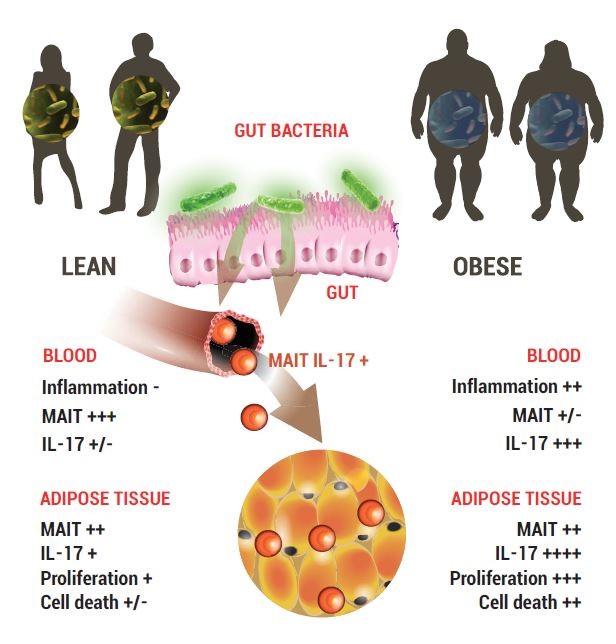
Scientists at Institut Cochin (CNRS/Inserm/Université Paris Descartes) and ICAN — Institute of Cardiometabolism And NutritionInserm/UPMC/AP-HP) have discovered that a class of inflammatory cells, MAIT lymphocytes1, is deregulated in patients suffering from type 2 diabetes and obesity. In these patients, bariatric surgery (or a gastric bypass)2, which relieves inflammation, can restore the normal functioning of MAIT cells. Already known to be activated by certain bacterial populations and to favor inflammation, these cells may explain the link between alterations that affect the intestinal flora (microbiota) and the inflammatory nature of these diseases. These findings are published on 9 March 2015 in Journal of Clinical Investigation.
Type 2 diabetes3 and obesity are severe and intimately related pathological conditions whose incidence is increasing in France4 and throughout the world. These diseases with multiple causes (dietary changes, sedentary lifestyle, combined with genetic predispositions) are associated with chronic inflammation, induced by the immune system, which is abnormally activated. This inflammation is present not only in the blood but also in the organs involved in metabolic control of the body, such as the liver and adipose tissue. It also contributes to a loss of glycemic control. Furthermore, recent studies have shown that the gut flora of diabetic and obese patients is modified to a significant degree.
However, the link between the alterations of the gut flora and the chronic inflammation observed in these pathologies is poorly understood. But some inflammatory cells — specific T-lymphocytes called MAIT — are activated by certain bacteria. Research teams coordinated by Karine Clément and Agnès Lehuen thus tried to determine whether these cells were modified in patients with type 2 diabetes or obesity.
Their findings revealed a clear alteration of these MAIT lymphocytes: their levels were very markedly reduced in blood samples, and were even undetectable in a quarter of obese patients. However, adipose tissue from diabetic and obese patients contained much larger quantities of these lymphocytes than those found in healthy subjects. Indeed, their activation was enhanced, producing large quantities of cytokines (inflammatory molecules).
In addition, after bariatric surgery (gastric bypass), which is known to improve diabetes and inflammation, the frequency of circulating MAIT lymphocytes increased, returning to the levels observed in non-obese and non-diabetic subjects. Similarly, the production of cytokines by MAIT lymphocytes was markedly reduced after this surgical procedure.
These results highlight a strong correlation between MAIT lymphocytes and metabolic dysfunctions. They suggest that these cells participate in the development of type 2 diabetes and obesity. The scientists propose that they might be activated by an alteration of the gut flora (microbiota) in such patients, thus increasing inflammation. The next step will be to verify the link between these MAIT cells and the microbiota. For example, do patients who no longer display circulating MAIT cells have a different microbiota from that seen in subjects in whose blood such cells can still be detected? To answer these questions, the researchers are now planning to sequence the microbiota of obese patients, before and after bariatric surgery.
Story Source:
The above story is based on materials provided by CNRS (Délégation Paris Michel-Ange). Note: Materials may be edited for content and length.
Journal Reference:
- Isabelle Magalhaes, Karine Pingris, Christine Poitou, Stéphanie Bessoles, Nicolas Venteclef, Badr Kiaf, Lucie Beaudoin, Jennifer Da Silva, Omran Allatif, Jamie Rossjohn, Lars Kjer-Nielsen, James McCluskey, Séverine Ledoux, Laurent Genser, Adriana Torcivia, Claire Soudais, Olivier Lantz, Christian Boitard, Judith Aron-Wisnewsky, Etienne Larger, Karine Clément, Agnès Lehuen. Mucosal-associated invariant T cell alterations in obese and type 2 diabetic patients. Journal of Clinical Investigation, 2015; DOI: 10.1172/JCI78941
